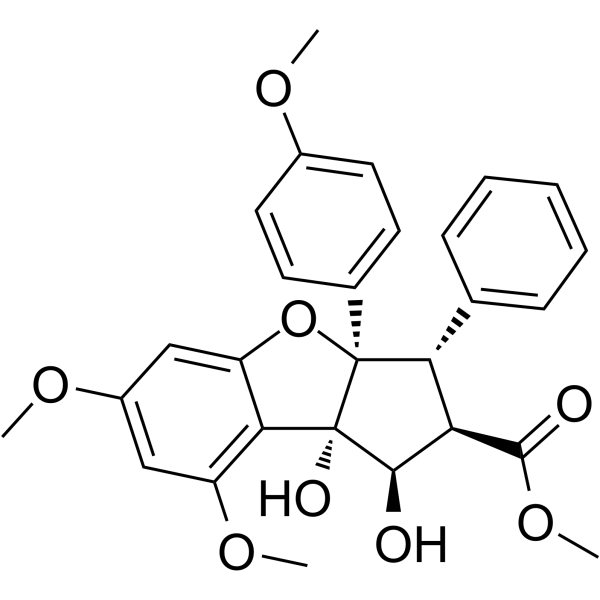All AbMole products are for research use only, cannot be used for human consumption.

For this product's availability, delivery time and price, please email [email protected] directly or click the "Inquiry Now" button below.
Aglafoline inhibits in a selective and concentration-dependent manner the aggregation and ATP release reaction induced in washed rabbit platelets by PAF (platelet-activating factor). The IC50 values of Aglafoline on PAF (3.6 nM)-induced platelet aggregation were about 50 μM. ic50 value: 50 μM Target: PAF in vitro: Aglafoline also inhibits [3H]PAF (3.6 nM) binding to washed rabbit platelets with an IC50 value of 17.8 ± 2.6 μM. The concentration-response curve of PAF-induced platelet aggregation was shifted to the right by Aglafoline with pA2 and pA10 values of 5.97 and 5.04, respectively. Although thromboxane B2 formation caused by collagen and thrombin was partially suppressed by Aglafoline, thromboxane B2 formation caused by ionophore A23187 and arachidonic acid was not affected. Aglafoline inhibited the [3H]inositol monophosphate formation caused by PAF but not that caused by collagen or thrombin in the presence of indomethacin (20 μM). in vivo: The cAMP content of washed rabbit platelets was not affected by Aglafoline. Rat femoral intravenous administration of Aglafoline (10 mg/kg) did not affect blood pressure. However, Aglafoline (10 mg/kg) both prophylactically and therapeutically antagonized PAF (2.5 μg/kg)-induced hypotensive shock in rats. Intravenous PAF (30 ng/kg) caused severe bronchoconstriction in guinea pigs. This effect was completely blocked by Aglafoline. This implies Aglafoline is an effective PAF antagonist not only in vitro, but also in vivo.[1]
| Molecular Weight | 492.52 |
| CAS Number | 143901-35-3 |
| Solubility (25°C) | Ethanol 90 mg/mL DMSO 21.43 mg/mL |
| Storage |
Powder -20°C 3 years ; 4°C 2 years In solvent -80°C 6 months ; -20°C 1 month |
[2] Florian Astelbauer, et al. Activity of selected phytochemicals against Plasmodium falciparum
[4] J M Negro Alvarez, et al. Platelet-activating factor antagonists
[5] F N Ko, et al. PAF antagonism in vitro and in vivo by aglafoline from Aglaia elliptifolia Merr
| Related Products |
|---|
| 2-Deoxy-2-fluoro-D-glucose
2-Deoxy-2-fluoro-D-glucose is a radiolabeled glucose analog, which is commonly used in medical imaging techniques such as positron emission tomography (PET) scans. |
| 2-Bromo-4-chlorophenylacetic acid
2-Bromo-4-chlorophenylacetic acid is a biochemical reagent. |
| CPN-351 TFA
CPN-351 TFA is a selective pentapeptide antagonist of human NMUR1 with a pA2 of 7.35. CPN-351 TFA can be used for the research of inflammation. |
| 5-Phenyluracil
5-Phenyluracil is a pyrimidine derivative, a class of heterocyclic aromatic organic compounds crucial in biochemistry. It serves as a synthetic nucleoside analogue, meaning it mimics the structure of naturally occurring nucleosides like uridine. This structural similarity allows it to participate in biochemical reactions, often interfering with normal cellular processes, making it a valuable tool in studying nucleic acid metabolism and developing antiviral and anticancer agents. |
| 7-Deoxyloganin
7-Deoxyloganin is a biosynthetic precursor of Loganin. 7-Deoxyloganin undergoes hydroxylation catalyzed by 7-deoxyloganin 7-hydroxylase, a cytochrome P450-dependent monooxygenase, to produce Loganin. |
All AbMole products are for research use only, cannot be used for human consumption or veterinary use. We do not provide products or services to individuals. Please comply with the intended use and do not use AbMole products for any other purpose.


Products are for research use only. Not for human use. We do not sell to patients.
© Copyright 2010-2024 AbMole BioScience. All Rights Reserved.
